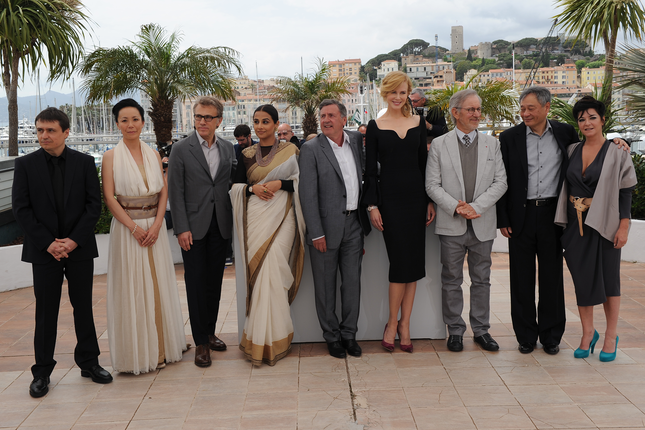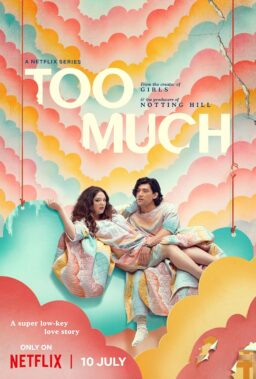Air Force One slid past my parked Delta flight in the dark at JFK late Tuesday night, as many of us on board were heading for the Cannes Film
Festival, and in unison we stared at the lighted windows of this taxiing
symbol of might. It reminded me a little of the magical scene near the
end of Fellini’s “Amarcord,” when the family out in a rowboat gazes in
awe at a mammoth ocean liner as it passes very near them in the night.
Not to wax poetic, but the Cannes festival might be that ocean
liner: big, powerful, close enough to touch but remote in its enduring
capacity to remain the ultimate symbol of aspiration, dreams, and power
for many in the film world.
Power is rarely discussed at Cannes, and it’s ostensibly all about
art, although careers can hang on critics’ approval, and whether films
are sold here, and to how many regions of the world. The annual jury
press conference on the opening day is the first and foremost love-fest
in which the concept of competition is downplayed and jurors find novel
ways to sidestep the question of comparing one film to another in order
to award the Palme d’Or in ten days.
Steven Spielberg, president of the jury, is the man who gets to act
akin to emperor, dictator and prom king all rolled into one for the
duration of the festival. Looking sedate and a bit Gatsby-esque in a
pale sport coat, dark tan vest, plaid tie, and wire-frame glasses on a
Gatsby kind of day, he broke the ice with “Everyone sits in judgment on
us; so, it’s our turn.”
“Mr. President” as he will be called over the next two weeks, soon softened that with, “There are certain films that compete for a
specific audience. That doesn’t really allow me to compare these apples
to these oranges. It’s really not fair to compare a movie that has a
goal of getting as many people into the theaters as possible with a film
that has the goal of changing the way you look at yourself, the way you
look at others, and the way you look at life.”
Spielberg’s jury encompasses a fair number of people who have
launched their careers at Cannes or had their international reputations
made here, including: actress Nicole Kidman; Romanian director and
former Palme d’Or winner Cristian Mungiu; two-time Oscar winner
Christoph Waltz; Taiwanese-American director and multiple Oscar-winner
Ang Lee; British director Lynne Ramsay; veteran French actor Daniel Auteuil; Indian actress Vidya Balan, and Japanese director Naomi Kawase.
Waltz appeared to be confessing to some flashback moments regarding
being judged himself at Cannes, saying “Walking up the stairs and
walking in here [the press conference room], I forgot I was a juror; the
memory was too strong.”
Nicole Kidman, looking remarkably like an ingenue, with her blonde
hair tied back with a black satin ribbon that matched her simple low-cut
black shift, laughed heartily when asked whether her husband Keith
Urban had passed on any judging advice as a result of his recent stint
on “American Idol.” “No,” she said, but noted that he’d be joining her
in Cannes in two days time.
Addressing an inquiry as to how he felt about serving on a jury
under his recent Oscar rival Spielberg, Ang Lee countered with a most
politic answer, saying in his characteristic, soft-spoken way: “Do I
believe in the absolute value of competition—of course not. Steven and I
are good friends. I don’t know how he looks at me, but I worship him;
he is my hero.” Spielberg’s follow-up was equally tactful, if a bit
roundabout: “I worship “The Life of Pi,” so I worship Ang.”
Asked whether he preferred “the carrot or the stick approach” to the
jury process, Spielberg said, “I’m going to have to look at the Sidney
Lumet film ‘Twelve Angry Men’ to prepare myself for the final day of
deliberations.”
The jury was soon hustled by security guards to the waiting freight
elevator. Dozens of photographers strained at the stanchions along
their path, some still shouting “Steven!” as the elevator doors closed.

F.
Scott Fitzgerald is making a return to the Riviera, in a manner of
speaking, as he wrote The Great Gatsby just up the road from Cannes.
According to director Baz Luhrmann, whose adaptation has thus far been a
popular success, if not a critical one, Fitzgerald’s wife Zelda was
indulging in an affair on the beach even while her husband labored away
on his novel of lost love.
“The Great Gatsby” opened in the U.S. on May 10, and today it opens
the Cannes festival in tonight’s gala. The film had its debut for the
international press this morning. I’d already seen it back in Chicago,
at an advance screening where many of the attendees were decked out in
Roaring Twenties costumes, but I attended the press conference here to
get a sense of how it was received in the world at large.
Luhrmann was joined by Carey Mulligan and Leonardo DiCaprio, as well
as other major talent including actors Tobey Maguire, Isla Fisher, and
Joel Edgerton, screenwriter Joel Pearce, and producer/production
designer Catherine Martin.
The guests were still out of sight beyond the door of the press room
when the profusion of camera flashes lit up the darkened doorway like a
fireworks display. Unlike on the red carpet, there’s no ceremonial
entrance at these press events, just a quiet and quick filing in.
Mulligan was wearing a strapless black dress and huge diamond ear
studs. DiCaprio’s ruddy complexion was set off by a dark, trim goatee
and mustache.
Luhrmann kept the discussion rolling at a brisk pace, leaving little
room for questions. He revealed that he first read Fitzgerald’s novel
while riding on a train through Siberia many years ago. Pearce recalled
reading it as a teenager and being fascinated by “glamour, romance, and
drunkenness.” The working method of the two involved reading the
entire novel aloud to each other.
Pearce and Luhrmann were pretty much the whole show, with the others
backing them up with a chorus of compliments. According to DiCaprio,
“You cannot get in a room with this man and not feel inspired.”
Given
the fact that “The Great Gatsby” had already been largely trounced by
U.S. critics, I expected at least something by way of fireworks on the
discussion floor. There wasn’t even a flicker of criticism; this was
another love-fest in progress. A Greek critic compared the film to
“Citizen Kane,” with Daisy equivalent to Rosebud. Although evidently
flattered, Luhrmann demurred at the comparison, citing “Casablanca” as a
film he considered to be the more likely touchstone.
Although the popularity of his films has often been over the top,
Luhman’s relationship with critics has generally been touchy, something
he readily acknowledges. When “Strictly Ballroom” premiered in the
Quinzaine section of Cannes back in 1992, the extended rhythmic applause
and standing ovation rocked the theater. I hadn’t liked it much but
was obviously at odds with popular opinion — a pop phenomenon was clearly
being launched before my eyes. By 2001, Luhrmann was enough of a Cannes
veteran and world figure that “Moulin Rouge” was invited to open the
festival.
Addressing those who might trash “The Great Gatsby” after today’s
screening, Luhrmann said, “I love it; if you’re thinking about it
[writing a negative review], go for it. Don’t hold back. I’m alright
with that. I just care that people are going out and seeing it.
Crowds lining the red carpet in the pouring rain were shrieking with
delight as the “Gatsby” guests and stars arrived at the Palais for the
official opening. Meanwhile, I was headed to the other side of the
Palais for the press screening of the first film to debut in
competition. “Heli” by Mexican director Amat Escalante (“Los
Bastardos,” “Sangre”) is a sad and exceptionally brutal tale of violence
that emanates from the drug trade.
The film opens with the shocking image of a bloodied man gagged with
duct tape and lying in the bed of a pickup truck, the booted foot of
another man pressing his face to the floor. He is subsequently hanged
from a viaduct, his pants yanked down around his ankles. The first half
of “Heli” backtracks from this scene of horror, to build the story of a
family’s destruction that begins when 12-year-old Estela, still a
little girl in most ways, falls in love with Berto, a 17-year-old police
trainee.

Reminiscent of the work of his countryman Carlos Reygadas, Escalante
has a talent for evoking the visceral with power, and building tension
and dread with subtle strokes. The bodies of his characters have a
solidity and awkwardness that is realistic yet not documentary-like.
This makes scenes of torture, of which one is extended and particularly
savage, very difficult to watch.
Estela lives with her father, brother, newly married Heli, and his
wife and baby. She and Berto talk secretly of getting married. Berto
has naively stolen contraband drugs, which he has hidden in Estela’s
home, unknown to the others, and plans to sell to finance their new
life. The theft is quickly discovered, and a hell of retribution is
visited upon them all.
The second half of the film is almost surreal in the way that
Escalante calmly juxtaposes mind-bending violence with normalcy. The
film’s central torture scene takes place in a roughly furnished living
room where three kids are playing a video game. Half-bored, they stop
to watch. “What did this one do,” asks one. “Who know,” another
replies.
A scene in which tons of confiscated illegal drugs are destroyed
involves a bizarre public ceremony accompanied by heralding trumpets,
snare drums, recruits standing at attention, and a roster of politicos
viewing the massive conflagration. That many of those involved in
enforcement are also behind the drug trade is something the film makes
all too clear.
Naïveté and futility are both central to the plot. Escalante evokes
an endless cycle of corruption and entrapment. The police are also
marauding gangsters, rapists, and murderers. No one can be trusted. The message is dark, and yet there is a paradoxical gentleness and
beauty in the director’s vision.
The rain continues to pour down as the night ends. Last year’s
Cannes festival was marked by an unprecedented number of thunderstorms,
and this one is headed for an unpromising start weather-wise. “Let it
rain” looks to be the theme of the next three days!












